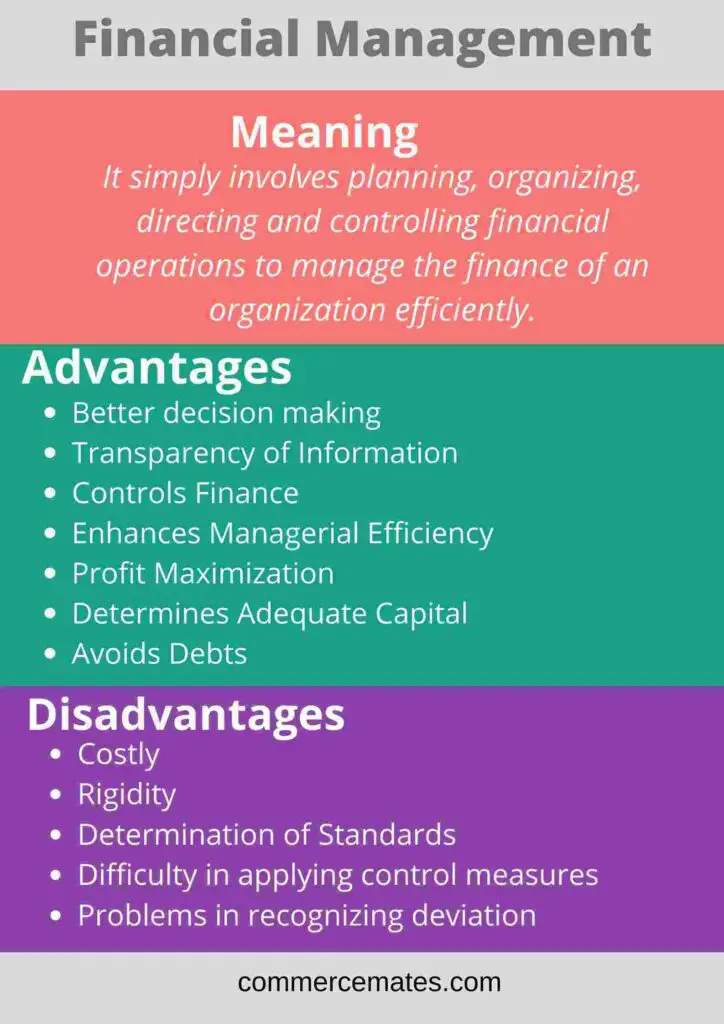Every organization injects a large amount of funds into their activities for earning desired profits. Proper regulation of all financial resources is must for avoiding any losses and maintaining a proper efficiency rate. Organization should properly procure funds and deploy them into most profitable projects for attaining estimated growth. All this is possible via right supervision of all finances by finance managers which is termed as Financial management.
But what exactly is the term ‘financial management’ and in what way it is useful for business.
Let’s discover the same in the well-summarized article below:-
Contents
Meaning of Financial Management
Financial management is a term related with management of financial resources of business enterprise for deriving maximum returns. It involves proper supervision of all funds across the organization for lowering risk and improving the overall profitability rates. Financial management ensures the long-term continuity of business by maintaining a adequate amount of cash flows at every point of time.
Concept of Financial Management
Financial Management means applying management principles to manage the financial resources of an organization. It simply involves planning, organizing, directing, and controlling financial operations to manage the finance of an organization efficiently. Financial Management is a methodology that a business implements to monitor and govern its revenue, expenses, and assets in order to maximize profitability and ensure sustainability. Management of finance is a vital part of every business.
Financial management ensures that an adequate amount of funds is always available in business from different sources and also it earns the best return on its investments. It aims at the achievement of two main objectives for an organization that is profit maximization and wealth maximization. All the decisions in financial management are taken by focusing on the achievement of these two important objectives.
Following are the chapters of Financial Management
Nature of Financial Management
- Financial management determines the capital requirements of organization for carrying out its activities.
- Financial management sets an optimum capital structure for business in order to raise its efficiency and profitability.
- Financial management considers the safety, profitability and liquidity of every investment avenue before allocating any fund into it.
- Financial management raises the shareholder’s value by bringing down the cost of operations and increasing profitability.
- Financial management apply financial controls for limiting the cost of operations within the pre-decided budget.
- Financial management properly manages all cash flows for avoiding any surplus and deficiency situations.
Read Full Article

Scope of Financial Management
- Financial management supervises all investment decisions of business for deriving optimum results.
- Financial management takes proper dividend decisions for business by deciding a right optimum dividend payout ratio.
- Financial management takes every financial decision of firm for raising the needed funds at economic cost.
- Financial management regulates the working capital decisions by deciding investments in current assets and current liabilities.
- Financial management maintains proper liquidity within the organization by monitoring all inflows and outflows of cash.
Read Full Article

Importance of Financial Management
- Financial management forecasts the cash needs of business for continuing its operations.
- Financial management works toward raising required funds from different appropriate sources of finance.
- Financial management ensures proper usage of all resources by supervising all ongoing activities.
- Financial management facilitates cost control for business by preparing proper budgets.
- Financial management leads to better disposal of funds by taking right decisions relating to dividend distribution and ploughing back of profits.
- Financial management regulates all cash movements by properly recording every cash inflow and outflow.
- Financial management sets proper mix of debt and capital for designing proper capital structure.
Read Full Article

Features of Financial Management
- Financial management determines both short-term and long-term financial needs of business.
- Financial management selects the most economical sources for raising the required capital.
- Financial management decides the appropriate balance in-between debt and equity for reducing the cost of capital.
- Financial management chooses the right dividend policy for firm taking into consideration all expansion and growth possibilities.
- Financial management deploys the acquired funds into right means in order to generate the required profits.
- Financial management maintains adequate amount of working capital at all times for avoiding any obstruction to continuity.
Read Full Article

Characteristics of Financial Management
- Financial management manages all financial resources of business for maintaining proper liquidity.
- Financial management is a continuous function which need to be practiced on a regular level.
- Financial management aims at right usage of all resources for making efficient profits.
- Financial management control the cost within the organization by implying distinct cost control techniques.
- Financial management lower the risk rate for every organization by attaining a proper balance between risk and return.
- Financial management enhances the overall profitability of enterprise by increasing the efficiency of business.
Read Full Article

Fundamentals of Financial Management
- Financial management focuses on profit maximization and wealth maximization for firm via proper application of funds.
- Financial management maintains stability of cash for organization by monitoring all transactions.
- Financial management make efforts for long-term survival of firm by maintaining its profitability in long run.
- Financial management ensure optimum utilization of resource by keeping a complete watch on all operations.
- Financial management brings down the capital cost for business by acquiring it from economical sources.
- Financial management makes proper estimate of funds requirement of business to avoid any surplus or deficit.
- Financial management designs optimum capital structure by deciding proper mix in between debt and equity.
Read Full Article
Advantages of Financial Management
- Financial management supports efficient decision making by firm via acquiring all key financial information.
- Financial management provides transparency of information by maintaining a systematic record of every information.
- Financial management raises the overall managerial efficiency by controlling any wastage of resources.
- Financial management estimates the right amount of fund requirements for every business organization.
- Financial management focuses on avoiding debts by right allocation of funds.
- Financial management raises the business profitability and wealth of shareholders by minimizing the cost of operations.
Read Full Article

Disadvantages of Financial Management
- Financial management may be a costly process for business enterprise as it requires implementation of various tools.
- Financial management comprises of difficult tasks where distinct standards are set up for measuring the actual performance.
- Financial management may create difficulties while implying various financial control measures.
- Financial management is useful only if real reasons for deviations in performance are known.
- Financial management may lead to setting up improper standards due to the absence of proper setup criteria.
Read Full Article
Role of Financial Management
- Financial management properly manages the capital of business for earning desired profits.
- Financial management takes appropriate financial decisions for keeping all expenses of firm within the pre-decided budget.
- Financial management maintains proper cash flow within the business by supervising all cash movements.
- Financial management make efforts towards risk management of organization by maintaining reserve for any unforeseen event.
- Financial management formulates right policies for carrying out activities and deploying resources of business.
Read Full Article

Objectives of Financial Management

- Financial management maximizes the profit of business by formulating proper strategies and taking right decisions.
- Financial management focuses on maximizing wealth of shareholders by controlling expenses and enhancing profitability.
- Financial management improve goodwill of business by providing peoples with quality service at reasonable cost.
- Financial management aims at effective utilization of funds by selecting the realistic and profitable projects.
Read Full Article